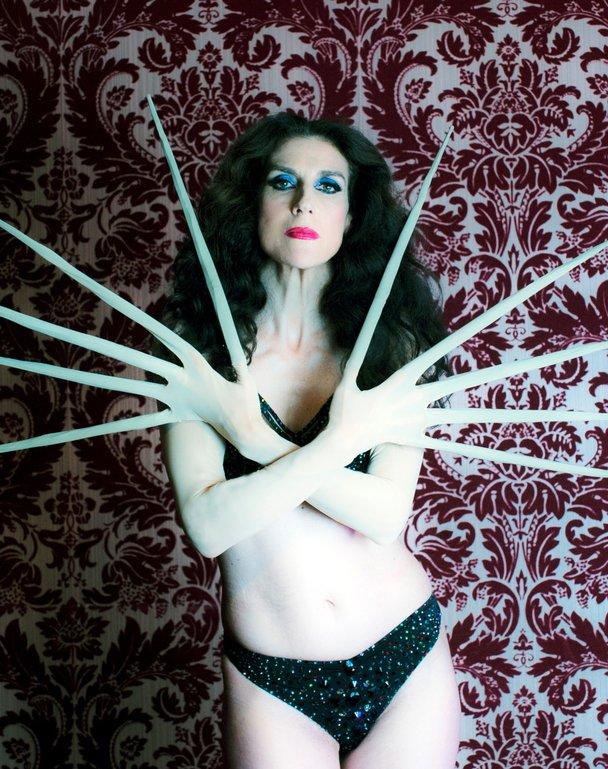Pogorišče seksističnih stereotipov

Navdušenje nad Gotharamino morbidno estetiko je stvar osebnega okusa, a za ljubiteljice_e temačnega je pravljična burleska Moire Finucane poslastica. Njena odrska prezenca je izjemna in med številnimi popolnoma različnimi liki lahkotno prehaja zgolj s pomočjo večjih ali manjših kostumskih menjav. Predstava je v kabarejskem formatu sestavljena iz številnih kratkih prizorov, ki sprava sledijo gotskemu duhu zapuščenih dvorcev, zasneženih gozdov in demonskih ljubimk, kasneje pa presenetijo s popolnoma drugačno estetiko in nenavadnimi izbori glasbe. Vsebinsko v njej tako ni zares mogoče najti rdeče niti, vendar pa ji zaradi neprekinjene intenzivne energije in premišljene režije uspe ohraniti gledalkino_čevo pozornost.
Edina skupna točka arhetipov, ki jih preigravata Finucane in pevka Clare St Clare – slednja je že od začetka v vseh pogledih predstavljena kot Moirin nedolžni kontrast in ima v preveč prizorih funkcijo prej njenega dopolnila kot pa enakovredne akterke – je ženskost. Kljub temu da v nekaterih zgodbah in pesmih omenjata moške, imajo ti vlogo, na katero so v androcentičnih delih zreducirane ženske: zavajajo in umirajo, da dajo ženskam tragično noto, jih naredijo bolj zanimive in premikajo njihove zgodbe naprej. A v središču ostajajo prav te ženske zgodbe in odnosi med ženskami, pa naj gre za matere, hčere, sestre, družabnice ali ljubimke. Finucane neusmiljeno prevzema tudi najbolj moške arhetipe (kot je na primer rok zvezda, na neki točki pa celo vstane od mrtvih kot seksi Jezus) in jih prestavlja v ženski in kvir kontekst. Pri tem se izogne pasti poenostavljanja in tudi pogosto enodimenzionalni ženski arhetipi pri njej zaživijo v polni kompleksnosti čustvovanja, preračunljivosti, ranljivosti, ljubezni in zlobe, pogosto vse hkrati. Tudi ko upodablja erotiko – in Finucane velik del predstave preživi gola ali napol gola, flirta s publiko in osvaja St Claire – je ves čas jasno, da so vse niti v njenih rokah. »Vem, da se me hočeš dotakniti,« zaprede v prvem prizoru. »Dotakni se me in potem ti bom odsekala prste in jih vpletla v svojo mrežo.« Predstava se tudi konča s subverzijo podobe erotiziranega prehranjevanja, ko Finucane skodelico paradižnikove juhe spremeni v kri in v objemu svoje ljubimke odkoraka iz odra. Gotharama tako na pogorišču seksističnih stereotipov ustvarja nov svet in ta je osvežujoče ženski.
***
THE RUINS OF SEXIST STEREOTYPES
Gothrama’s morbid aesthetics will not appeal to everyone but for the lovers of macabre Moira Finucane's fairy tale burlesque is a treat. Finucane's stage presence is incredible and the switches she makes between various contrasting characters are sleek and effortless. The format of the show is reminiscent of a cabaret, consisting of a number of short scenes which start off in the gothic spirit of abandoned castles, winter forests and demonic Sapphic lovers but go on to surprise the viewer with a completely different aesthetics and unusual music choices. All in all it would be a challenge to find a common thread in the show content-wise but the continuous intensity and the well thought out directing choices manage to keep the viewers' attention.
Finucane is joined on stage by the singer Clare St Clare who is from the very start made out to be an innocent contrast to Finucane’s ferocity and who in one too many scenes seems more of a background character than an equal part of the story. The two take on several archetypes whose only common denominator is that of the female experience. Men are mentioned in a number of songs and stories but they are given the role of plot devices that women are usually reduced to in androcentric works: they are dying, and betraying women so the women can become more tragic and interesting and so their narratives can move forward al while women and relationships between them (be it between mothers, daughters, sisters, companions or lovers) remain the focus of the show. Finucane has no second thoughts about redefining any traditionally male archetypes such as that of the rock star, and at one point she even rises from the dead like a sexy Jesus, uprooting all of these tropes and giving them new, female and queer lives. She successfully manages to avoid the trap of simplification and resorting to stereotypes and creates for even the most one-dimensional female tropes complex emotional lives full of manipulation, vulnerability, love and malevolence, often all at once.
The show also features a lot of eroticism with Finucane spending a big portion of the performance (semi) naked, flirting with the audience and wooing St Clare, always making sure, however, that it’s clear she is the one in control. “I know you want to touch me,” she purrs in the very first scene. “Touch me and then I will cut off your fingers.” The show ends with a subversion of the scene of sexualised eating so often seen in the media and pop culture where Finucane turns a bowl of tomato soup into blood and walks off stage in her female lover’s embrace. The final impression is thus one of a complete ruin of sexist stereotypes and of a new, refreshingly womanly world built upon its ashes.
Ada Černoša